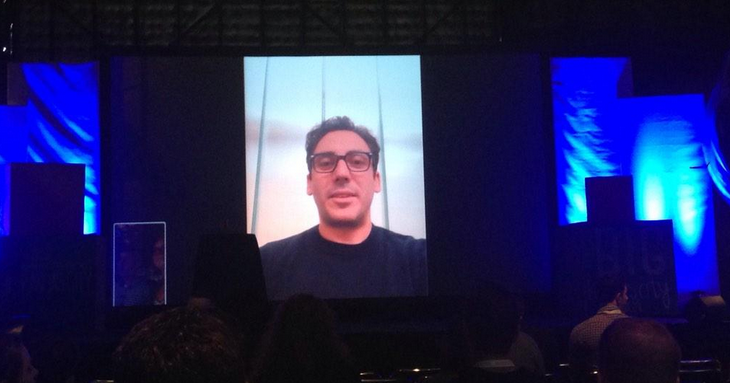![]() All of the Big Kansas City content wouldn’t be possible without Pinsight Media+. They’re a pioneer in mobile media with deep entrepreneurial roots. Their team brings leadership, experience and global awareness to Kansas City’s booming startup community. To learn more or talk with our friends at Pinsight, email Serge Bushman, sbushman@pinsightmedia.com.
All of the Big Kansas City content wouldn’t be possible without Pinsight Media+. They’re a pioneer in mobile media with deep entrepreneurial roots. Their team brings leadership, experience and global awareness to Kansas City’s booming startup community. To learn more or talk with our friends at Pinsight, email Serge Bushman, sbushman@pinsightmedia.com.
 When news broke that Neil Blumenthal, co-founder of eyewear company Warby Parker, wouldn’t present at Big Kansas City due to a canceled flight, the crowd was noticeably bummed. But since this conference is tech-oriented, organizers quickly found a solution: a video chat led by SPN’s Regan Carrizales and Jeff Slobotski.
When news broke that Neil Blumenthal, co-founder of eyewear company Warby Parker, wouldn’t present at Big Kansas City due to a canceled flight, the crowd was noticeably bummed. But since this conference is tech-oriented, organizers quickly found a solution: a video chat led by SPN’s Regan Carrizales and Jeff Slobotski.
Blumenthal started by explaining the back story of Warby Parker.
“My friends and I felt frustrated that glasses were so expensive. We would walk into a shop, get excited and then walk out feeling punched in the stomach. We wondered, when was somebody going to start selling glasses online? Then we realized, why not us? And why not do it in a way that’s good for customers and the world?”
The team at Warby Parker set out to design glasses they loved, sell them online and create a brand around the company. A bonus? Creating an inherent good along the way by helping people. For every pair of glasses sold, a pair is donated to someone in need. The company launched in February 2012, received some media coverage as a fashion brand, and then took off. In a matter of weeks, they had hit sales targets and had a waiting list of 20,000 people.
Four years and a million pairs of glasses later, Warby Parker moved into a new direction: retail space.
“We had this home try-on program, where you could get five pairs of glasses delivered to your home to try on, see how they look on your face, and then send back the ones you don’t want. It became so popular that we had to suspend it because we ran out of inventory. Then people started calling to ask about coming by our office to try on glasses, but we worked out of an apartment, not an office.”
Still, Blumenthal and team decided to let people stop by.
“It’s so rare that customers get a chance to see behind the curtain, but people loved it. And there was a dual benefit—we were able to better understand our customers. We learned that people wanted to be able to try on glasses. So we started testing out different displays, creating pop-up shops and finally signed a lease in New York City. That store performed so well that we opened seven more. But if you had asked me four years ago if I thought Warby Parker would ever have retail space, I would have said you’re crazy.”
By customers physically coming to the stores, the company could gather detailed information, such as what products people looked at before they made a purchase, and did people prefer full-length mirrors rather than the one-foot ones normally at optical shops.
“When you combine those fine details, you are able to create a better experience for the consumers, and that allows you to be more competitive. Do whatever it takes to observe your customers, talk to them, survey them. A store enabled us to do this day in and day out, which helped us take the e-commerce mindset to retail.”
Transparency continues to serve as one of Warby Parker’s core values. While designing and building the company, Blumenthal wanted to treat people the way he wanted to be treated, and knew that transparency was something he craved from other companies.
“We spent a lot of time before launch thinking about what our company would stand for: fun, creativity, doing good in the world. And we knew that in the age of the Internet, you can’t hide. Customers will find out everything anyway, so you might as well share it in a way that has positive effects. Six months after launch, we asked our team to write down the five values by which they lived their life. People turned them in, and we realized most of the concepts were quite similar. We discussed them as a group, narrowed to the top three, and those became the values by which we hire, fire and make decisions. It’s easy to make decisions once you have your values in place.”
Credits: Photo by Abbey Tingle.




